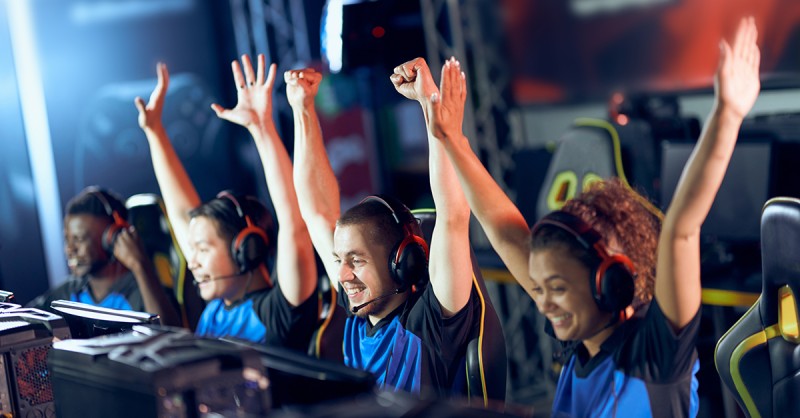
Play & Stream
Massive multiplayer online games - great fun or addictive nonsense?
Many children love them – and often get into trouble with their parents because of it. Massive Multiplayer Online Games (MMOs) are played over the Internet. Players immerse themselves in a virtual world via the web and meet up with many others online. It sometimes takes months to complete an MMO game. How far you get in a game phase is saved on the Internet, so you can also take breaks in between.
There are three types of MMOS:
- First, the Massive Multiplayer Online Role-Playing Games, MMORPGs for short. These are role-playing games in which you get your own hero figure, an avatar. The avatar then has to master adventures together with others or solves tasks. He develops during the game. Today, the most successful MMORPGS connect many millions of players all over the world. There are even MMORPGS for very young children. One example are online role-playing games in which you look after your own virtual horse and take part in competitions.
- The second type of these games are construction and management games. You take control of a football team, a city, a state or an entire planet. To succeed and defeat the other players, you have to earn different things like tokens or virtual money, also called ingame currency, which you can use to buy new football players, for example. Or workers and construction materials that enyou to build a city.
- Last but not least, there are "Virtual Battlefield" games. They are also called massive multiplayer online first-person shooter games, or MMOFPs for short. These games are often very brutal, with wars being fought and other players being shot. They are usually only allowed from the age of 16 or for adults.
Although parents often see it differently: Multiplayer games aren't inherently bad for kids. But a few rules should be observed:
- Only choose age-appropriate games.
Even if it's annoying not to be allowed to play your big brother's game: If it's stated that a game is only suitable for older players, you should go by that. Otherwise, you probably won't be able to keep up with other players or you might get nightmares. - Limit the playing time.
Children under the age of five are best not to participate in such games at all. For young primary school children, about half an hour a day can be okay. Around the 10th or 11th birthday, playing time might be longer, at about one hour. From the age of 14, many experts recommend a maximum of 1.5 hours. Gambling all day is certainly not a good idea for anyone. - Keep an eye on the costs.
Many MMOs are free, but some are very expensive. In most of them, you get online money as a reward for successfully completing tasks, which players can use to gear up. Often, however, the best progress is made by those who also use real money. Logically, many children want to keep up and then also begin to invest their allowance in the game. To prevent a draining of funds, a fixed monthly budget is recommended. - Play as a family.
No idea what that weird medieval stuff is about that captivates the kids? When parents take an interest in what's going on in online games, it often helps avoid a lot of arguing. If the children are allowed to explain the rules of the game and give dad or mum tips, it will create a bond. If there is trouble with other players or a child feels bullied, it is also much easier to jointly develop a good strategy.
A prejudice that is not true, by the way: Massive multiplayer online games do not make you lonely. If you play together with many others, you make new contacts and perhaps even meet new friends. However, you should still maintain your friendships in the real world, at football or at school – no game can replace the real deal.
